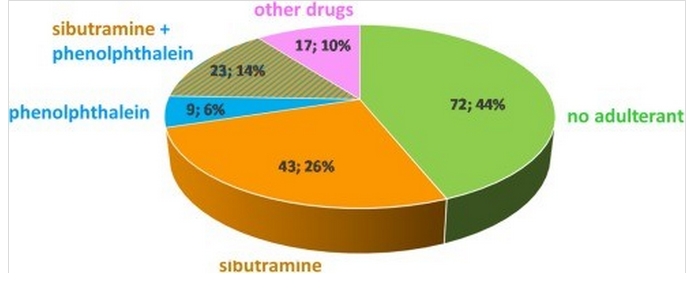Proton NMR for detection, identification and quantification of adulterants in 160 herbal food supplements marketed for weight loss
Journal of Pharmaceutical and Biomedical Analysis Volume 124, 30 May 2016, Pages 34–47 Rabab Hachem
Highlights
• 1H NMR analysis of 160 “100% natural” weight loss food supplements.
• 56% were tainted with 6 active pharmaceutical ingredients.
• Sibutramine, phenolphthalein or a mixture of the two compounds were mainly detected.
• Manufacturers change the chemical composition of formulations over time.
• Poor manufacturing practices were revealed.
One hundred and sixty food supplements (FS) marketed for weight loss and mainly purchased on the Internet were analyzed. All the FS were claimed as 100% natural containing only natural compounds, plant extracts and/or vitamins and the presence of an active pharmaceutical ingredient (API) was never mentioned. 1H NMR spectroscopy was used for detecting the presence of adulterants and for their identification and quantification. Mass spectrometry was used as a complementary method for supporting their identification. Among the 164 samples considered because capsules from 5 different blisters of the same FS were analyzed, 56% were tainted with six API.
Forty three contained sibutramine as single adulterant (26%), 9 phenolphthalein (6%) and 23 a mixture of these API (14%) that were both withdrawn from the market several years ago because of toxicity concerns. Sildenafil was found in 12 samples, either as a single adulterant (n = 5) or in combination with sibutramine (n = 3), phenolphthalein (n = 3) and both sibutramine and phenolphthalein (n = 1). Fluoxetine was present in 4 formulations, alone (n = 3) or in combination with sibutramine and orlistat (n = 1). At last, lorcaserine was detected in one FS. The content of sibutramine per dosage unit was comprised between 0.1 and 22 mg and that of phenolphthalein between 0.05 and 56 mg. The study also highlights poor manufacturing practices as evidenced for instance by the variability of API in capsules from different blisters of the same box. This paper demonstrates the need for more effective quality control of weight loss FS and the efficiency of 1H NMR spectroscopy for the detection of tainted FS.














